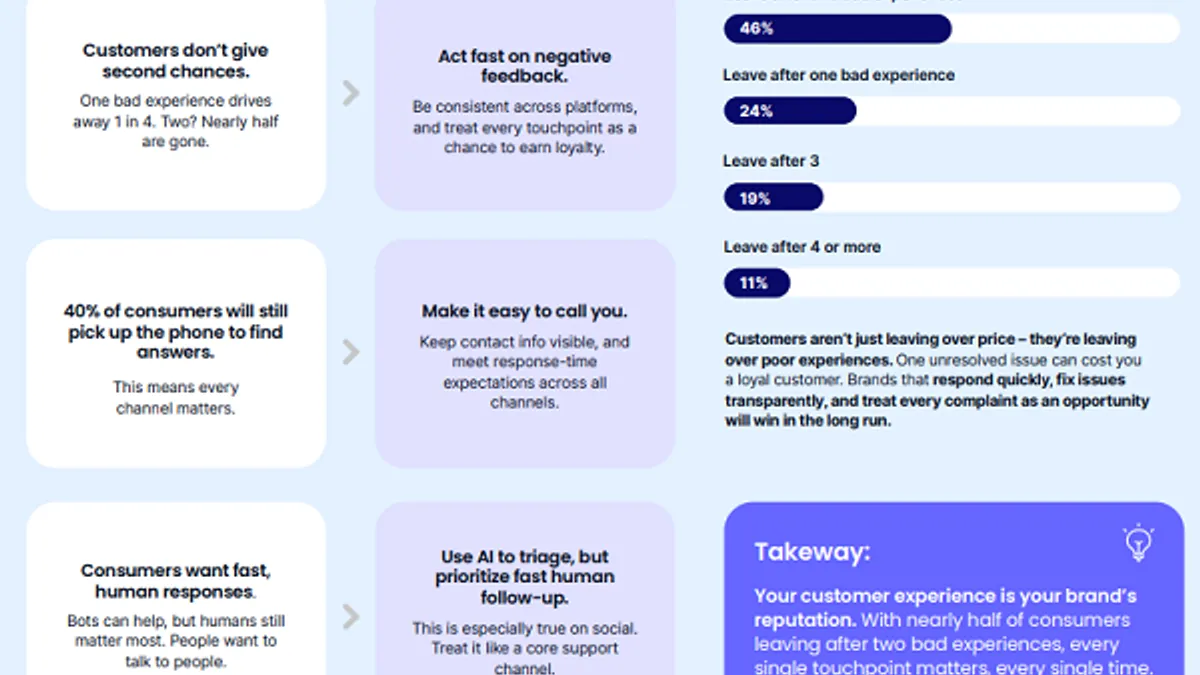As artificial intelligence takes over the more mundane and data-crunching tasks inherent in marketing, experts see creativity and strategic vision as two areas where human expertise will continue to be in-demand regardless of how prevalent the technology becomes.
Early adopters can benefit from deep AI-driven insights, but, at some point, the tech is likely to offer less of a competitive advantage as it saturates the market. Marketers worried about being replaced by a machine can get ahead right now by figuring out how their current job function integrates with AI. Looking toward the future, it will be important for marketers to build their personal expertise in the skills that AI technology will not be able to replicate as easily.
"AI is fantastic at certain things, especially forecasting, automation, segmentation and optimization," Michael Godwin, creative director at artificial intelligence startup Noodle.ai, told Marketing Dive. "While those tasks may sound mundane, the triad of contemporary hardware, data and algorithms has 'unlocked' puzzles that are orders of magnitude more complex than what we traditionally used computers for."
"Those marketers who can match even one of their core tasks with a learning algorithm will enjoy a head start not easily matched by competitors," Goodwin said.
However, for some tasks, AI is an "instantly and massively scalable workforce (and) ignoring that capability just isn't sustainable," he added.
Data literacy
Early in the history of digital marketing, it became apparent that the data around digital activities was fundamentally different than that with traditional channels like out-of-home and media like TV, print and radio.
Digital data was more precise, more robust and way more prevalent, eventually leading to today’s sophisticated marketing automation solutions. Adding in later developments like the growth of martech and advances in artificial intelligence gets the industry to the present day where being comfortable with data is an important part of many marketers' jobs.
The case can be made that marketers should be pleased that AI tech is, in a sense, taking some data-driven tasks off their plates by handling the job much faster and more precisely.
"Slide rules didn't last long after the calculator. Spreadsheets and simple linear regressions are going the same way," Godwin said.
James O’Malley, SVP of Analytics, Porter Novelli, Omnicom’s public relations arm, said marketers should embrace the increased automation of lower level tasks, even if it results in a smaller staff, because it lets marketers focus on higher level strategy and brand architecture and creates a new freedom for broader strategic initiatives.
"Regardless of their role or level, marketers across functions will need to learn how their organization’s data is captured, how to interpret its outputs and connect them to meaningful actions for their company."

James O'Malley
SVP, Analytics, Porter Novelli
To realize such freedom, marketers need to ensure they truly understand the underlying data behind the automation and AI functions, which means data literacy is key for today’s marketer, according to O’Malley.
"Regardless of their role or level, marketers across functions will need to learn how their organization's data is captured, how to interpret its outputs and connect them to meaningful actions for their company," he told Marketing Dive. "Artificial intelligence will make block-and-tackle data and analytics tasks more automated, allowing marketers to, at all levels, use data in new ways to uncover insights about their audiences, optimize their programs and demonstrate the effectiveness of their work."
Staying nimble
Godwin sees marketers' role as being more of an ongoing learning experience as AI tech continues to evolve and improve. He advised marketers to educate themselves on what AI can and can't do and cautions this will be a frequent exercise given the current pace of AI research.
"As you learn about AI's strengths, challenge yourself to imagine how best to leverage it on some task you do every day," Godwin said. "For example, if you could precisely predict consumer demand, how could you use that information to alter your campaign strategy or targeting decisions?"
"If you could precisely predict consumer demand, how could you use that information to alter your campaign strategy or targeting decisions?"
Michael Godwin
Creative Director, Noodle.a
Godwin added that even though creativity and strategy will continue to be the marketers' domain, there will be surprises such as teams leveraging AI to augment creativity and improve strategy.
AI will vastly improve the data ETL process — extracting, transforming and loading — according to O’Malley. However, people will still be required to set things in motion by interpreting data in a way that is meaningful for consumers.
"Knowing how and when to zig when the data tells you to zag will be the key to standing out in your industry," stated O’Malley.
Architecting systems
Where AI really shines and will continue to improve is uncovering trends and changes in massive data sets. For example, analyzing credit usage versus online behavior is a task where AI will be able to flag meaningful trends in millions of data rows much more efficiently than a human analyst, per O'Malley.
Under these circumstances, marketers can provide value as architects of marketing ecosystems handling ongoing marketing activities across customer channels instead of planning specific campaigns.
"We will be able to build libraries of assets with different messaging, look-and-feel and offers that are then delivered to customers based on their behaviors," O’Malley said. "Consumers will experience brands in even more individualized ways than the rudimentary targeting available to marketers now."
Keeping it real
The growing use of AI in marketing could introduce some challenges that human beings might be better at detecting. For example, O’Malley points to the potential for increased distance between marketers and their audiences as AI increasingly serves as an intermediary between the two, something that could be detrimental to marketers' ability to come up with creative ideas as well as understand the marketplace.
The best marketers will be able to leverage AI data to provide the kind of creative insight that turns data-crunching into campaign gold by delivering the authenticity that consumers demand today. This might mean combining historical and real-time data to understand what customers might do next in order to reach them with the most personalized, relevant experiences possible, Leslie Fine, VP of Data & Analytics, Salesforce Marketing Cloud, told Marketing Dive.
Marketers will also be required to turn AI-driven insights into an overarching strategy that can successfully make an emotional connect with consumers.
"AI is already changing our world in unexpected ways," said Godwin. "Marketers are at the vanguard of deciding whether to use these new tools for good or 'evil.' Embrace AI and use it to provide value and delight."
AI is already the "winner" in predictions and forecasts from total market to audiences, segments and even individual preferences. But AI’s impact on marketing won’t stop at these data-crunching activities.
"There's tremendous opportunity and untapped potential for AI to influence all areas of martech and ad tech, including smarter programmatic ad buying," Fine said. "As AI technology continues to increase in sophistication and becomes more integrated into martech and adtech, we look forward to exploring these opportunities."






















